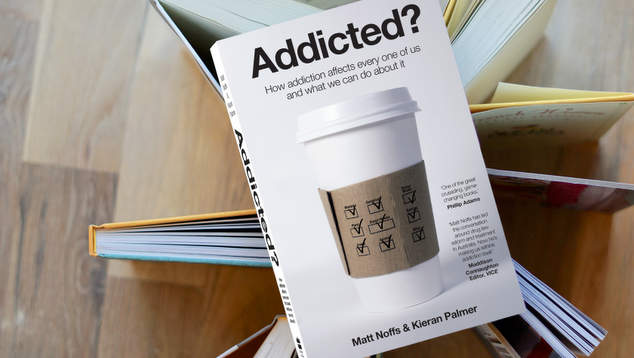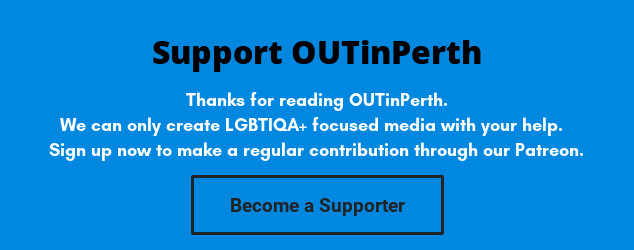
Matt Noffs runs Street University, an early intervention service that aims to connect kids with their local communities. He comes from a family who for generations have worked with people in the area of addiction.
He’s teamed up with psychologist Kieran Palmer to write Addicted? A book that challenges our notions of what addiction is, and how we should be treat people whose lives are affected – and they poses a revolutionary thought – aren’t we all, on some level, addicted to something?
For Noffs and Palmer they started out wanting to write a book about what they new about addiction from working with young people whose lives were being controlled by their dependence on heroin or ice, but as they progressed they realised they had something more complex, and more universal to talk about.
“The more we looked into it, the more realised addiction wasn’t something that just some people have and some didn’t have, like a malady. It is actually something that the latest research tells us is something that we all share – and it’s not always negative.” Noffs said.
In fact the authors believe that from our earliest ages we are constantly becoming obsessed and captivated with different things whether it be dinosaurs, dolls or a particular pop star- there are many times one thing has all of our attention.
“It’s like when we fall in love with someone, that’s no different to ice or heroin.” Noffs offers as a relatable touchpoint. “The difference is when we fall in love with someone, and we’re spending breakfast, lunch and dinner with them, you and I can recalibrate after some time. We’ll upset a few friends, and block everything out for the first couple of week, but after a few weeks we’ll come back out to our friends and spend some time with them and they’ll want to know all the gory details of what we’ve been up. We’ll recalibrate.”
The ability to recalibrate and remake connections to the other important things in our lives in the key difference Noffs said we should be considering.
“A person who has fallen in love with a drug like ice or heroin is just like us when we’ve fallen in love. We’re not talking about someone who just goes out to a nightclub who uses it once in a year, but someone who has fallen in love with it and is using it everyday, and they find themselves with an addiction that is spiralling out of control.
“The difference isn’t the type of addiction they have, their brain is acting in the same way as when you or I have fallen in love, however – they don’t have the same support structures around them. It’s the protective factors.
“There was a study done around fifty countries around the world where they found these four common protective factors, and it’s looking at those protective factors that has helped us to realise the difference between a debilitating addiction – and the addictions that all of us grow up with and use in really mostly positive ways in our lives.” Noffs said.
After reading Addicted? it struck me that Noffs and Palmers tome is a flipside to the shelves of business books that are currently filling airport bookshops delving into the art of developing positive habits for productivity.
“That’s right, and one way you can think about addiction is as something you can harness. One you can understand what it is your brain is doing, you can use that to your advantage, but this also just as important to realise when something is becoming destructive.” Noffs said.
The author shares his own personal experience of getting wrapped up in his own work, compulsively checking for new email messages, and ignoring his family – noting its the same process when something consumes too much of your life – we need to recalibrate.
Noffs agrees that Australia could more effectively tackle the issue of addiction if more resources were put into mental health facilities, but argues that they are different areas.
“Mental health is one of the protagonists of addiction, and there’s lots of stories in the book about how mental health plays into addiction, but it’s also important to remember that they are two distinct things – addiction is not a mental health issue – but it can become one.”
At a time when politicians increasingly look to simply discussions for easy consumption, having a nuanced and insightful discussion on the nature of addiction is quite a challenge, it hardly fits alongside a mantra of ‘tough on crime’. Noffs said we need to look at changing the conversation that we’re having.
“How do we get politicians to change the conversation, and spread a message which is more informed and evidence based, as opposed to the same old rhetoric that really just calls for the building of more prisons and millions of dollars spent on law enforcement and the drug war?” Noffs asks.
He believes gradually politicians are changing and are beginning to look at evidence based approaches and looking for new ways to tackle the challenges.
“The drug war has failed and we need to think about things differently.” Noffs said. “Most people have an underlying assumption that drugs are a problem and people’s choices got them there – but when we start to dig away at that assumption we start to realise that it is incredibly wrong.
“How do we change that belief, evidence is one thing, but I think stories are powerful and that’s what I hope this book does. We need to increase empathy and understand that addiction is about all of us, not just the unfortunate ones.”
Addicted? Is published by Harper Collins and available now.
Graeme Watson





